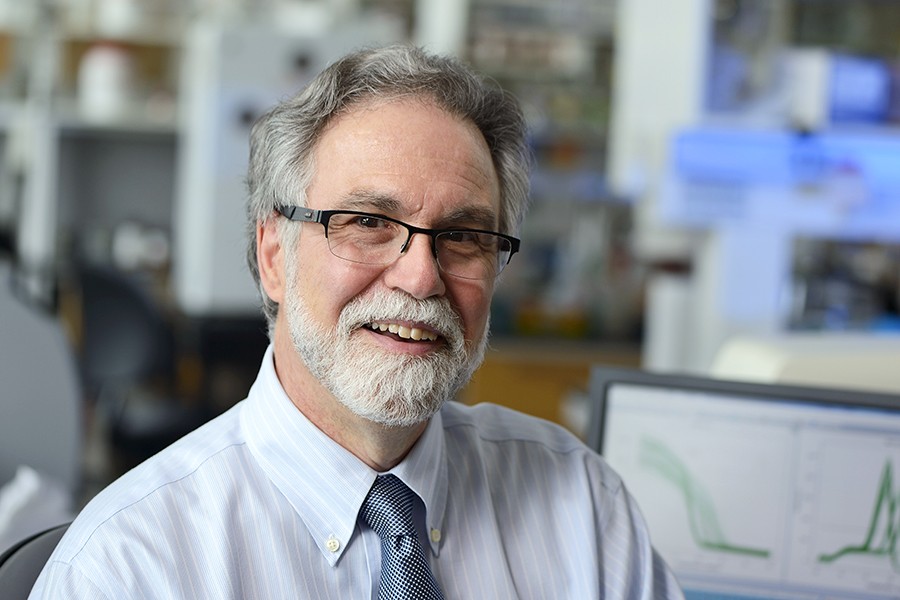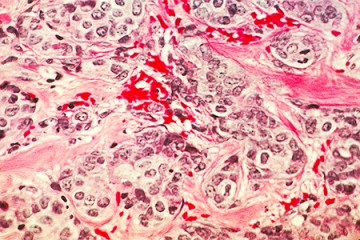Gregg L. Semenza, whose discoveries on how cells respond to low oxygen levels could result in treatments for illnesses ranging from cancer to diabetes, today was among three researchers given the 2016 Albert Lasker Basic Medical Research Award.
The Lasker Foundation recognized Semenza, the C. Michael Armstrong Professor of Medicine at the Johns Hopkins University School of Medicine, along with co-winners William G. Kaelin Jr. of the Dana-Farber Cancer Institute and Peter J. Ratcliffe of Oxford University, for the "discovery of essential pathways by which human and animal cells sense and adapt to the presence of oxygen," according to the foundation.
Semenza is best known for his groundbreaking discovery of hypoxia-inducible factor 1, or HIF-1, the protein that switches genes on and off in cells in response to low oxygen levels. The discovery, along with Semenza's additional work clarifying the molecular mechanisms of oxygen regulation in cells, has far-reaching implications in understanding the impact of low oxygen levels in cancer, diabetes, coronary artery disease, and other conditions.
HIF-1 plays a prominent role in enabling cancer cells to adapt to low oxygen levels, while also affecting how the body responds to low oxygen levels related to heart attacks, angina, and other cardiovascular conditions.
By opening the field of oxygen biology to molecular analysis, Semenza's research paves the way for the development of drugs that could kill cancer cells by cutting off the supply of oxygen a tumor needs to grow or could increase the ability of HIF-1 to ensure that tissues affected by such conditions as arterial disease can survive on low oxygen levels.
For 71 years, Lasker Awards have recognized the contributions of scientists, clinicians, and public servants who have made major advances in the understanding, diagnosis, treatment, cure, or prevention of human disease. They are among the most prestigious awards in science. In addition to the Albert Lasker Basic Medical Research Award, the foundation today announced winners of its awards for clinical research and for special achievement. The 2016 Lasker Awards, which carry an honorarium of $250,000 for each category, will be presented on Sept. 23 in New York City.
Semenza, a member of the Institute for Cell Engineering, the McKusick Nathans Institute of Genetic Medicine, and the Sidney Kimmel Cancer Center, thanked the Lasker Foundation for the award and emphasized that the recognition highlights the value of "discoveries driven by pure curiosity."
"It is difficult to overstate the implications of Gregg's work for both understanding fundamental biology and advancing human health," said Landon King, executive vice dean for the Johns Hopkins University School of Medicine. "His groundbreaking discovery of the hypoxia-inducible factor has started an entire new field of research, and his outstanding service to the Johns Hopkins community—his involvement with multiple training programs, teaching several courses each year, and leadership in the institution—is a draw for talented graduate students, fellows, and faculty members. We are very proud to have Gregg as a colleague."
Added Paul B. Rothman, dean of the medical faculty and CEO of Johns Hopkins Medicine: "Defects in oxygen regulation are central to the course of disease onset and progression, and Gregg's contributions already have influenced the search for better diagnostic and therapeutic approaches to many diseases."
Semenza is the first of five children. He was born in New York City and grew up north of there, in Westchester County. His love of science developed thanks to his biology teacher at Sleepy Hollow High School. He attended Harvard University for his bachelor's degree. While there, a family friend had a child born with Down syndrome, which inspired him to study pediatric genetics.
He earned his MD/PhD from the University of Pennsylvania, studying the genetic disorder beta thalassemia. From there, he went to Duke University to complete his internship and residency in pediatrics. He moved to Johns Hopkins in 1986 for a postdoctoral fellowship in medical genetics and has been there ever since. He met his wife, Laura Kasch-Semenza, at Johns Hopkins. She now runs a genotyping lab in the Genetic Resources Core Facility. Semenza is the founding director of the vascular biology program at the Johns Hopkins Institute for Cell Engineering.
Semenza has authored more than 400 research articles and book chapters, which have been cited more than 100,000 times. He serves on the editorial boards of several scientific publications and is editor-in-chief of the Journal of Molecular Medicine. He has received the E. Mead Johnson Award for Research in Pediatrics, the Jean and Nicholas Leone Award from the Children's Brain Tumor Foundation, the Lucille P. Markey Scholar Award in Biomedical Science, the American Heart Association Established Investigator Award, the American Cancer Society Research Professor Award, the Lefoulon-Delalande Grand Prize from the Institut de France, the Stanley J. Korsmeyer Award from the American Society for Clinical Investigation, and the Canada Gairdner International Award. He is an elected member of the Society for Pediatric Research, American Society for Clinical Investigation, Association of American Physicians, National Academy of Medicine, and National Academy of Sciences.
Posted in Health, Science+Technology
Tagged cancer, gregg semenza, cell engineering, cell biology











